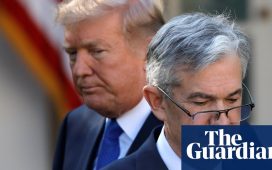Stephen Moore, a conservative economist whose controversial remarks about women cost him a seat on the Federal Reserve board in 2019, is now co-author of a plan to radically reform the US treasury as part of Project 2025, a vast rightwing effort to advance radical policy proposals for Donald Trump’s possible White House return.
“Project 2025 is all about forcing a far-right agenda on to everyday Americans,” said Tony Carrk, the executive director of the progressive watchdog Accountable.US, which produced an extensive report on Moore’s views and positions.
“So it’s no wonder they tapped a notorious social security opponent like Stephen Moore to help write their policy schemes.”
Moore, Carrk said, had “dedicated his career to slashing social security benefits and taxes for billionaires”.
Like other welfare programmes such as Medicare, social security is a longstanding target of the US right but also something of a third rail for politicians of either party, given public support. Recognising such support, Trump has pledged to “always protect social security” should he return to power. His last opponent for the Republican presidential nomination, the former South Carolina governor Nikki Haley, says she wants to reform it.
Joe Biden has said he “will not cut a single social security or Medicare benefit”.
Moore remains loyal to Trump but in the past has advocated for privatising social security, which he has called a “Ponzi scheme”, and told students they should march on the Capitol and burn their social security cards.
Responding to Carrk, Moore said by email: “Actually I favor higher social security benefits with personal accounts. That would give seniors benefits that would net three to five times higher.”
Moore advocates mandatory 401k accounts, in place of social security.
He added: “Yes, I am strongly in favor of cutting tax rates to make [the] American economy No 1.”
By its own description, Project 2025 is the work of “a broad coalition of over 70 conservative organisations”, brought together by the Heritage Foundation and aiming to shape the presidential transition should a Republican win election this year.
In the words of Paul Dans, its director, Project 2025 aims to prepare “a new army, aligned, trained, and essentially weaponised conservatives ready to do battle against the deep state”.
According to a conspiracy theory championed by Trump’s ally and adviser Steve Bannon – though Bannon reportedly said the “deep-state conspiracy theory is for nutcases” – the deep state consists of bureaucrats, government functionaries and intelligence operatives, all working to thwart Trump’s agenda.
Legal sources and sources close to the presidential transition have said extreme actions proposed under Project 2025 are unlikely to happen swiftly, should Trump or another Republican take office, given existing guardrails in and around the federal bureaucracy.
Nonetheless, as other chapters recommend rolling back LGBTQ+ rights or dismantling climate policy, so the chapter co-authored by Moore says a Trump treasury should eliminate policies attributed to Biden including the “racist ‘equity’ agenda” and the “economically destructive and ineffective climate-related financial-risk agenda”.
Moore’s co-authors are William L Walton, a private equity investor, and David R Burton, an economic policy expert. The three authors identify social security as a program relevant to treasury reform, including it in “issues of concern” that “cut across multiple parts of treasury or other governmental agencies”.
Elsewhere, Jonathan Berry, who was chief counsel to the Trump transition in 2016-17 and led the regulatory section of the Department of Labor in the Trump administration, notes the potential for privatisation of social security, writing: “Existing statutory language in the Social Security Act does not prohibit non-public organisations from administering the programme.”
In his statement, Carrk also accused Moore of “belittling women and people of color”.
In May 2019, Moore withdrew from consideration for a seat at the Fed. Amid intense media scrutiny, the Guardian reported tax and legal issues affecting Moore including underpaying alimony to his ex-wife. Columns written by Moore also came under scrutiny, unearthed sexist remarks including complaints about women in sports and asking whether there was anywhere in life “men can take a vacation from women”. Moore also wrote that Black families were replacing men with “a welfare check” and that increased earnings for Black women would make Black men “financially expendable”.
Withdrawing from consideration for the Fed, Moore said that the “unrelenting attacks on my character have become untenable for me and my family” but told Trump he would “continue to be a loud economic voice advocating your policies” and would “always [be] at your disposal”.
Moore went on to advise Trump during the Covid pandemic. Now, as well as writing books and providing analysis for Fox News, he is attached to a range of rightwing groups – he is a Heritage Foundation fellow; the senior economist at FreedomWorks; and chair of the Committee to Unleash Prosperity (CUP).
Moore co-founded CUP in 2015 with the billionaire Steve Forbes, the economist Larry Kudlow (later Trump’s chief economic adviser) and Arthur Laffer, an economist and pundit who advised Ronald Reagan and Trump and to whom Trump gave the presidential medal of freedom.
The Accountable.US report details donations of at least $1.77m to CUP from DonorsTrust, a rightwing group not required to reveal the names of its donors.
“A principled philanthropic partner for conservative and libertarian donors” in its own words, but “the right’s dark-money ATM” in the words of Mother Jones magazine, DonorsTrust has links to the Koch network and Leonard Leo, two dominant figures in rightwing political funding.
Carrk said: “With extremists like Moore calling the shots, Project 2025 may not have any credibility, but unfortunately they have limitless resources from the dark-money Leonard Leo network to undermine the health and retirement security of millions of Americans.”








